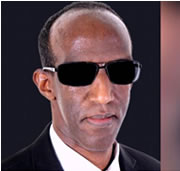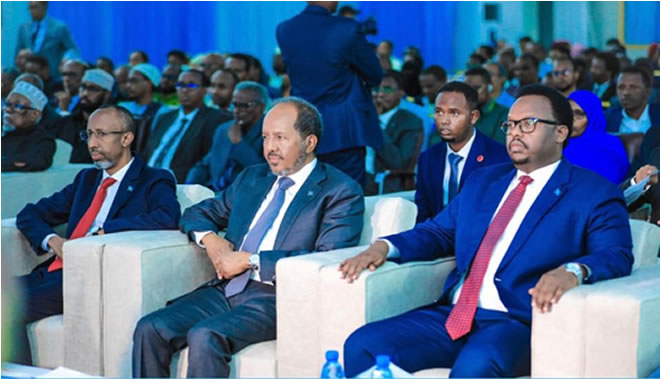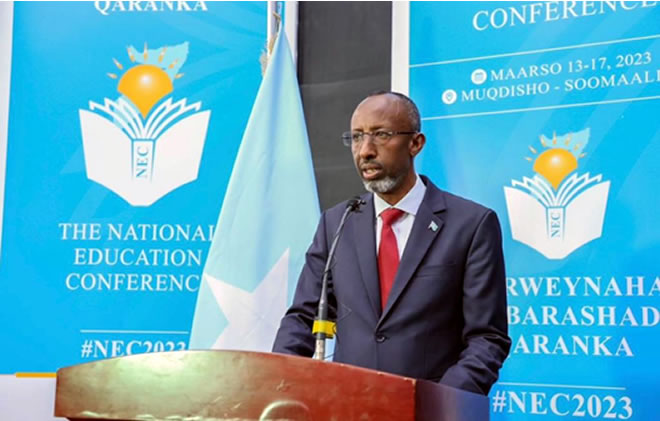 Abdirahman Farah (Luunge)
Abdirahman Farah (Luunge)
Tuesday March 28, 2023
The appointment of Minister Farah Sheikh Abdulqadir for the education portfolio of the Federal Government of Somalia was, in my view, one of the most appropriate decisions made by Prime Minister Hamza Abdi Barre. The process of ministerial position allocation in Somalia’s power-sharing politics does not, more often than not, conform to the principle of the right person for the right position; but this occasion was among the rarities. Minister Farah, or as the people from the Somali academia call him, Ustaad Farah, has made his name by playing a crucial role in rebuilding Somalia's education system from the ruins of the conflict as the result of the collapse of the State in 1991. Minister Farah and his colleagues of that time, whom President Hassan Sheikh Mohamoud was a prominent figure, have made an immensely commendable effort which produced lasting results. In a situation like that of Somalia, where 70% of the population are youth, education system requires someone who has an in-depth understanding of the issues at hand. Therefore, Minister Farah's exceptional track record of resuscitating the education system in the most impossible time, has made him the perfect choice for the position.

(Left):
Farah Sheikh Abdulqadir, Minister of Education, Culture & Higher
Education, President of the Federal Government of Somalia, Hassan Sheikh
Mohamud and Salah Ahmed Jama, Deputy Prime Minister of the Federal
Government of Somalia
Soon after his appointment, H.E minister Farah has immediately set himself on a path to reform the country's education system. The cancellation of fees paid by graduates from the secondary schools for obtaining their certificates was the first shot and this has been welcomed as a huge relief by both the parents and students. Additionally, he began the process of increasing the number of teachers employed by the government and oversaw the examination of over 8,000 applicants, out of which the Ministry will employ 3,000 new teachers. As part of that commitment, another significant initiative that Minister Farah spearheaded was the convening of the national education conference, which aimed to review and re-evaluate the status of the educational system in the country. From March 13th to the 17th, 2023, the MoECHE has successfully managed to hold a big national conference, with the theme “Transforming Our Society through Quality and Relevant Education”. This national convention has brought together more than 450 participants, who came from four corners of the globe. Participants included experienced ex-ministers of education from the 1970s to the present day, representatives of education authorities from Federal Member States, prominent academics, researchers, representatives from the private sector, parents, students, non-state actors, women’s organizations, the media, and international development partners and representatives from diplomatic missions in Somalia.
Organizing a conference of that magnitude, within a short period, was tremendously challenging but the mission was smoothly accomplished. An organizing team of talented experts and practitioners has been assembled by the Ministry, who worked tirelessly for a period of ten weeks prior to the conference. Their responsibility was to identify aims and objectives of the conference; prepare and outline main themes of the conference; call for research papers to be presented at the conference; and furthermore, to sort out organizational logistics to invite and accommodate over 100 participants from outside Mogadishu, mainly from the federal member states and diaspora communities.The conference was a resounding success, with participants presenting a total of 15 academic papers, seven presentations and several keynote speeches within the defined themes of the conference. All papers were well-researched and well-thought out which proposed practical and innovative ideas that address the existing obstacles and challenges. Papers have also put forward new ideas to expand access to free public education and accommodate the marginalised groups, including children with disability and special needs; improve quality and enhance governance of the education sector. The ambition, thoughtfulness and creativity of the contributors were reflected in the communique which has called for a wide range of reforms, improvements, and widening of the access to free education for all.

Moreover, among the ideas and discussions presented at the conference was the one exploring the national aims and goals of education. It has been authoritatively recommended that Somalia requires a national education system with a clear national purpose at its core. It was argued that the national education reform should focus on establishing education system which provides students with skills and knowledge; and more importantly foster core values including peace, tolerance, sense of justice, work ethic, solid national sentiment and national identity. These important values which are ethically underpinned by the normative Islamic teachings shield the children and the youth from all forms of extremism, be they religious, tribal, or populist, which have plagued our society for far too long. It has been made glaringly clear that this huge task could be successfully achieved when education is regarded as a national agenda for every Somali citizen. In my opinion, Minister Farah has the understanding, the commitment and the political will necessary to lead the campaign to achieve these objectives and bring them to a fruitful conclusion.
However, I noted that, despite the five-day conference providing an opportunity to discuss and engage with many thematic areas, the high number of invitees and speakers meant that the time allocated for panel discussions and Q&A sessions was not sufficient. In future events, organizers should consider limiting the number of contributors and speakers to allow for more open panel discussions and Q&A sessions. This will provide participants with ample time to engage with presenters, leading to a more meaningful and beneficial exchange of ideas.
Having said that, the success of this conference, which was truly national, was a clear positive example of what can be achieved with committed and visionary leadership. Minister Farah has demonstrated his leadership capabilities throughout the conference and inviting his predecessors to attend the conference and share their insightful thoughts with the participants was an outstanding sign of good leadership and magnanimity.
In conclusion, the National Education Conference organized under the leadership of Minister Farah Sheikh Abdiqadir was a great milestone for Somalia’s slowly but progressing education reform journey. Minister Farah's stewardship and dedication to the education reform were evident throughout the conference. Somalia’s political climate is known to be very unstable, and changes occur for all sorts of reasons. However, if Minister Farah remains in charge of the education portfolio in the coming three years or so, many ideas and recommendations from this conference are likely to be turned to a practical reality as he firmly pledged during the symposium.
With his vision and leadership, Somalia is on track to achieve a brighter future through education.
Abdirahman Farah (Luunge)
Email: [email protected]